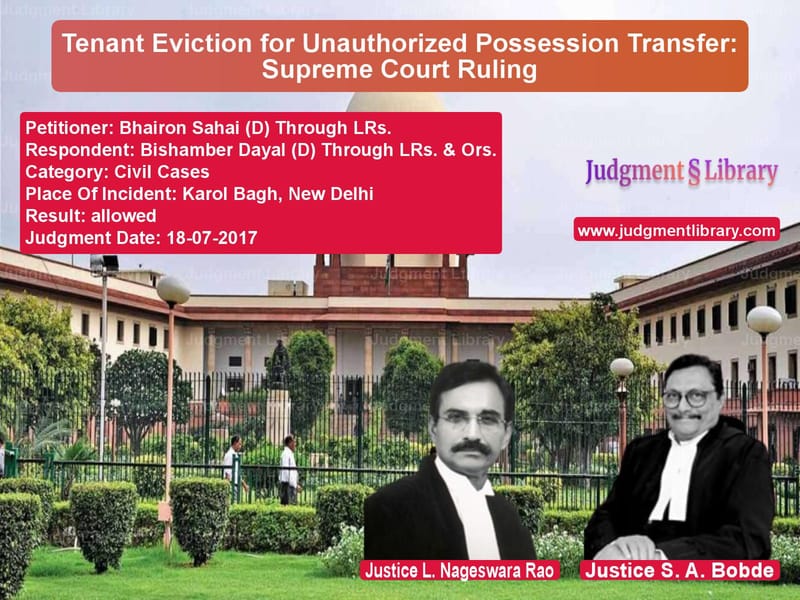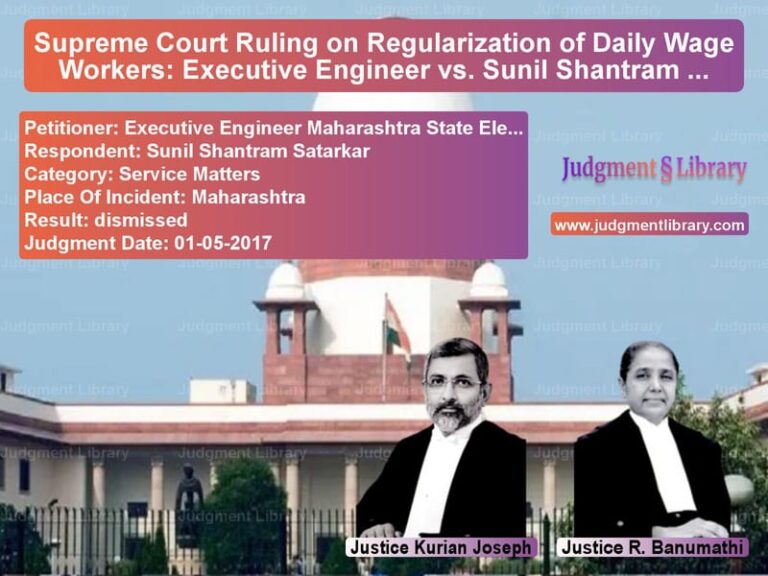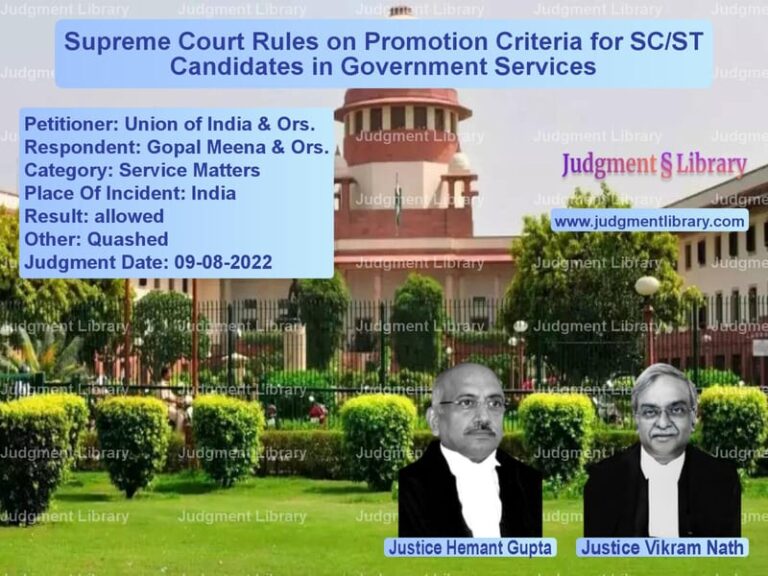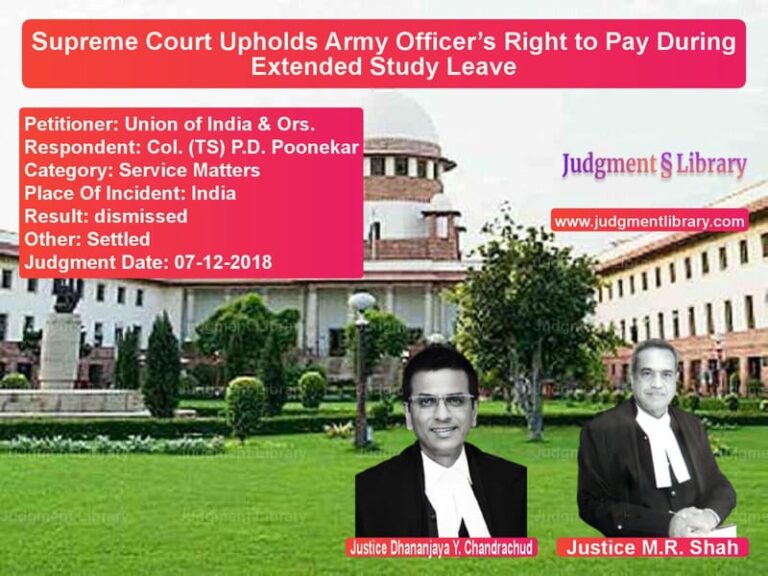Tenant Eviction for Unauthorized Possession Transfer: Supreme Court Ruling
The case of Bhairon Sahai (D) Through LRs. vs. Bishamber Dayal (D) Through LRs. & Ors. deals with a significant aspect of tenancy laws under the Delhi Rent Control Act, 1958. The case revolves around whether a tenant who allowed another person to occupy a portion of the rented premises without the landlord’s consent could be evicted. The Supreme Court’s judgment in this matter clarifies the legal principles governing subletting and unauthorized possession transfer in rental agreements.
The dispute arose when the appellant-landlord sought eviction of the respondents under Section 14(1)(b) of the Delhi Rent Control Act, 1958, on the grounds that the tenant had parted with possession of the premises without his consent. The Rent Controller ruled in favor of the landlord, but the decision was overturned by the Tribunal. The High Court upheld the Tribunal’s decision, leading to an appeal before the Supreme Court.
Background of the Case
Respondent No. 1 was a tenant of a shop measuring 138 square feet in Karol Bagh, New Delhi, since 1963, with a monthly rent of Rs. 54. The premises were purchased by the appellant in 1974. The appellant later issued an eviction notice, claiming that:
- The tenant had sublet a part of the shop to Respondent No. 2 without consent.
- Significant damage had been caused to the premises.
The respondents countered that the premises were not sublet but rather shared under a business arrangement. The shop was divided into two parts: one portion used for selling provisions, and another for running a fair price shop under a government license.
Petitioners’ Arguments
The appellant-landlord, represented by Senior Counsel Huzefa Ahmadi, argued:
- Respondent No. 1 had allowed Respondent No. 2 to occupy the premises without written consent, violating Section 14(1)(b) of the Delhi Rent Control Act.
- Under Section 14(4), subletting could be inferred where a partnership arrangement is used as a cover for parting with possession.
- The Tribunal and the High Court erred in overlooking the fact that Respondent No. 2 held a food grain license in his own name, and under the Delhi Rationing Order, only the licensee could operate a fair price shop.
- The eviction was warranted since Respondent No. 1 had no authority to let out the premises to another person.
Respondents’ Arguments
The respondents contended:
- Merely entering into a partnership does not amount to subletting.
- Respondent No. 1 was still in control of the premises, and Respondent No. 2 was only assisting in business operations.
- The partnership deed dated January 1, 1977, was a legitimate business agreement, and no unauthorized possession transfer had occurred.
- The eviction plea was invalid as there was no written lease agreement restricting partnership business.
Supreme Court’s Observations and Judgment
Justice L. Nageswara Rao, delivering the judgment, examined the statutory provisions and previous rulings. The Court held:
- The Delhi Rent Control Act prohibits tenants from subletting or parting with possession without the landlord’s written consent.
- The evidence indicated that Respondent No. 2 was running the fair price shop as an authorized distributor, independent of Respondent No. 1.
- The absence of written consent from the landlord was a crucial factor, making the arrangement illegal under Section 14(1)(b).
- The Court ruled that “Parting with the possession of the premises without consent of the landlord was sufficient for eviction of the tenant without getting into the question of sub-letting or assignment.”
- The appeal was allowed, and the respondents were ordered to vacate the premises within two months.
Key Legal Takeaways
The Supreme Court’s ruling reaffirms the following legal principles:
- Strict Application of Section 14(1)(b): Any tenant who allows another person to occupy premises without written landlord consent is liable for eviction.
- Unauthorized Possession vs. Subletting: Even if a formal sublease is not executed, parting with possession is sufficient to establish a violation.
- Importance of Written Consent: Any business arrangement involving a third party in a rented property must be backed by explicit consent from the landlord.
- Tenant’s Burden of Proof: If a landlord claims unauthorized possession transfer, the tenant must provide documentary proof that they retain control of the premises.
Impact of the Judgment
The ruling has significant implications for landlords and tenants:
- Landlords can initiate eviction proceedings if tenants hand over possession to another person without permission.
- Tenants must ensure they have explicit written consent before entering into any business partnerships that involve shared use of rented premises.
- The decision discourages fraudulent partnerships used to circumvent tenancy laws.
Conclusion
The Supreme Court’s judgment in Bhairon Sahai (D) Through LRs. vs. Bishamber Dayal (D) Through LRs. & Ors. clarifies the legal stance on unauthorized possession transfers under the Delhi Rent Control Act, 1958. The ruling underscores the importance of written landlord consent in tenancy agreements and ensures that property rights are protected against unauthorized occupancy. This judgment sets a strong precedent, reinforcing the strict interpretation of tenancy laws in favor of landlords while ensuring tenants abide by their legal obligations.
Don’t miss out on the full details! Download the complete judgment in PDF format below and gain valuable insights instantly!
Download Judgment: Bhairon Sahai (D) Th vs Bishamber Dayal (D) Supreme Court of India Judgment Dated 18-07-2017.pdf
Direct Downlaod Judgment: Direct downlaod this Judgment
See all petitions in Landlord-Tenant Disputes
See all petitions in Contract Disputes
See all petitions in Property Disputes
See all petitions in Judgment by L. Nageswara Rao
See all petitions in Judgment by S. A. Bobde
See all petitions in allowed
See all petitions in supreme court of India judgments July 2017
See all petitions in 2017 judgments
See all posts in Civil Cases Category
See all allowed petitions in Civil Cases Category
See all Dismissed petitions in Civil Cases Category
See all partially allowed petitions in Civil Cases Category







